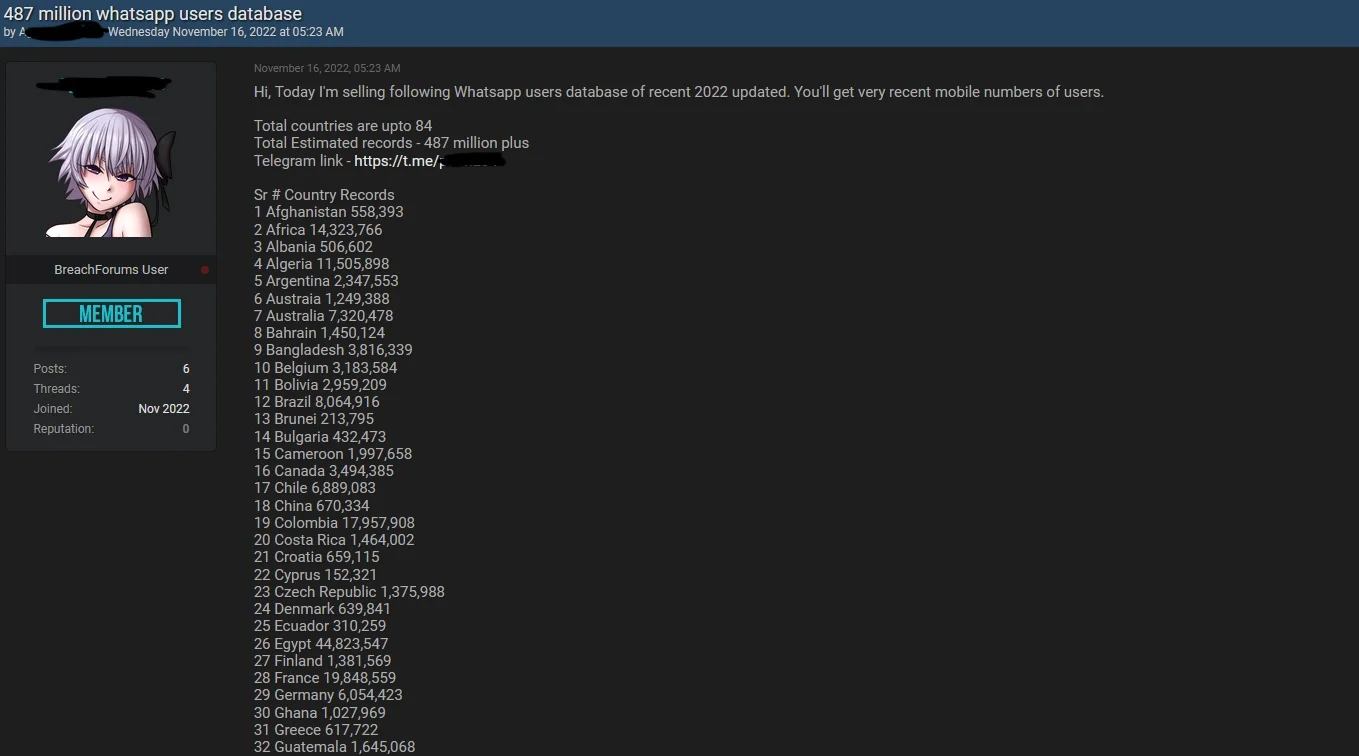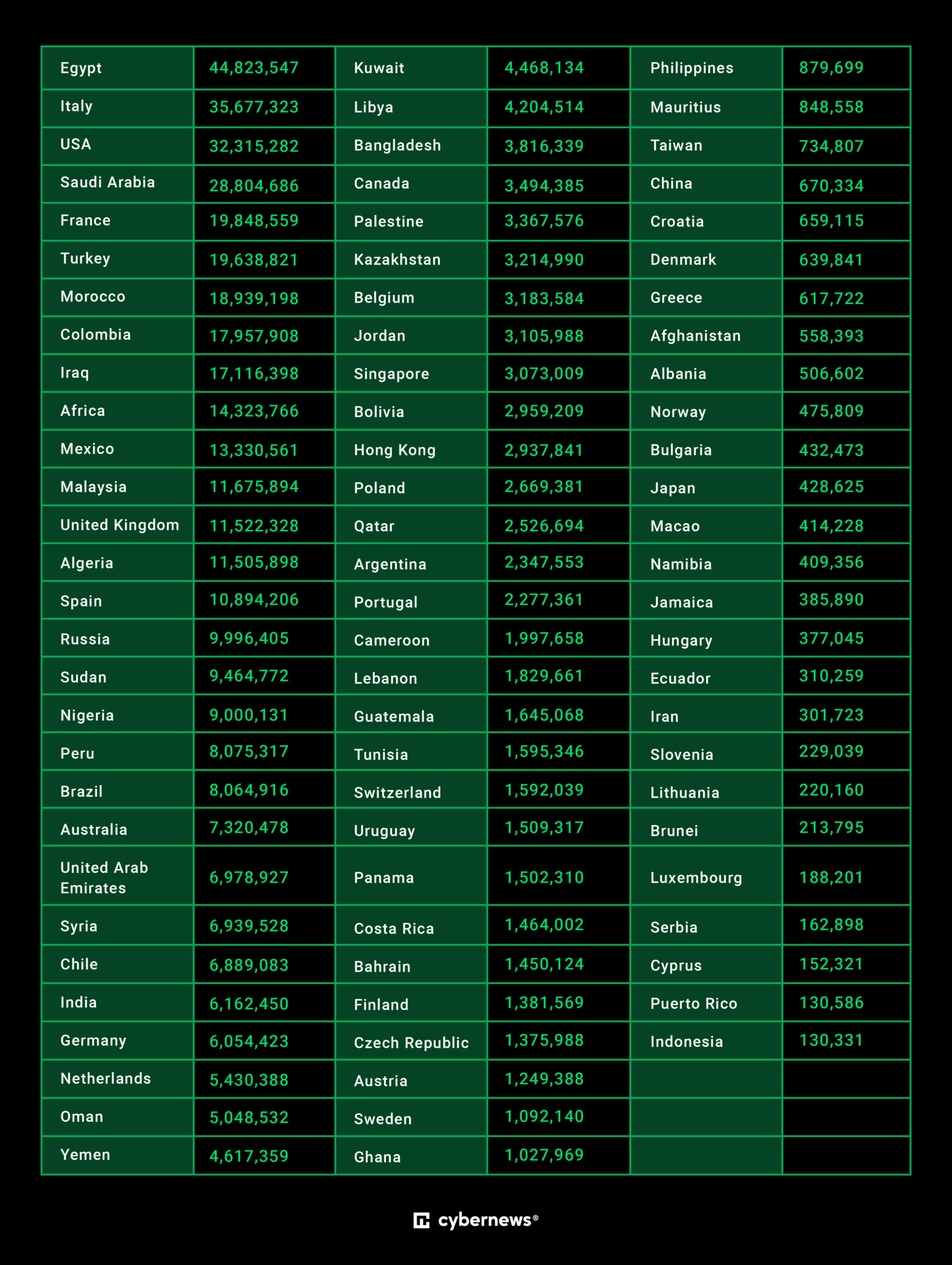News
WhatsApp Hacker Is Selling Over 150 Million MENA Numbers
The database contains nearly 500 million phone numbers from users worldwide, and is being sold on a community hacking forum.

According to Cybernews, a research-based online publication, a hacker is selling the phone numbers of nearly 500 million WhatsApp users on the Dark Web — a figure which includes over 150 million from across the MENA region.
The data from the breach was posted by a user on a hacking community forum, and Cybernews has sampled the data and confirmed that it’s legitimate.

The reported database contains recent (2022) WhatsApp user information from 84 countries, with millions of phone numbers listed from the USA, UK, France, Italy, Spain, Egypt, and many more.
Of particular interest to readers of Tech Magazine will be that nearly 7 million of the hacked numbers belong to UAE residents, just under 2 million are from Lebanon, and a massive 28.8 million are owned by users from Saudi Arabia.

We don’t know what the MENA phone numbers are valued at, but it’s reported that USA user information is being sold for $7,000, while UK and German datasets have $2,500 and $2,000 price tags, respectively.
Also Read: Netskope Predicts Future Middle East Cybersecurity Trends
After digging a little further into the details of the hack, Cybernews stated that the numbers harvested belong to active WhatsApp users and the data was obtained by scraping, which is thought to violate the app’s Terms of Service.
“In this age, we all leave a sizable digital footprint, and tech giants like Meta should take all precautions and means to safeguard that data,” says Mantas Sasnauskas, Head of the Cybernews Research Team.
Leaked phone numbers often fetch high prices on the Dark Web, as they can be used for marketing purposes, fraud and impersonation.
News
Rabbit Expands Hyperlocal Delivery Service In Saudi Arabia
The e-commerce startup is aiming to tap into the Kingdom’s underdeveloped e-grocery sector with a tech-first, locally rooted strategy.

Rabbit, an Egyptian-born hyperlocal e-commerce startup, is expanding into the Saudi Arabian market, setting its sights on delivering 20 million items across major cities by 2026.
The company, founded in 2021, is already operational in the Kingdom, with its regional headquarters now open in Riyadh and an established network of strategically located fulfillment centers — commonly known as “dark stores” — across the capital.
The timing is strategic: Saudi Arabia’s online grocery transactions currently sit at 1.3%, notably behind the UAE (5.3%) and the United States (4.8%). With the Kingdom’s food and grocery market estimated at $60 billion, even a modest increase in online adoption could create a multi-billion-dollar opportunity.
Rabbit also sees a clear alignment between its business goals and Saudi Arabia’s Vision 2030, which aims to boost retail sector innovation, support small and medium-sized enterprises, attract foreign investment, and develop a robust digital economy.
The company’s e-commerce model is based on speed and efficiency. Delivery of anything from groceries and snacks to cosmetics and household staples is promised in 20 minutes or less, facilitated by a tightly optimized logistics system — a crucial component in a sector where profit margins and delivery expectations are razor-thin.
Despite the challenges, Rabbit has already found its stride in Egypt. In just over three years, the app has been used by 1.4 million customers to deliver more than 40 million items. Revenue has surged, growing more than eightfold in the past two years alone.
Also Read: Top E-Commerce Websites In The Middle East In 2025
CEO and Co-Founder Ahmad Yousry commented: “We are delighted to announce Rabbit’s expansion into the Kingdom. We pride ourselves on being a hyperlocal company, bringing our bleeding-edge tech and experience to transform the grocery shopping experience for Saudi households, and delivering the best products – especially local favorites, in just 20 minutes”.
The company’s growth strategy avoids the pitfalls of over-reliance on aggressive discounting. Instead, Rabbit leans on operational efficiency, customer retention, and smart scaling. The approach is paying off, having already attracted major investment from the likes of Lorax Capital Partners, Global Ventures, Raed Ventures, and Beltone Venture Capital, alongside earlier investors such as Global Founders Capital, Goodwater Capital, and Hub71.


























